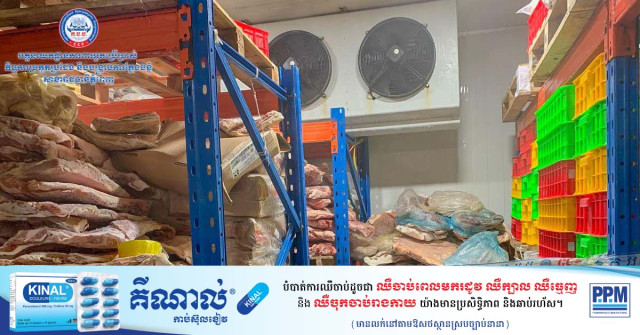Six-Month Ban Imposed on Frozen Meat Imports

- By Chhum Chantha
- January 12, 2024 7:10 PM
PHNOM PENH – Imports of some types of frozen meat and offal will be banned for six months, starting from Mar. 12.
The Ministry of Commerce and the Ministry of Agriculture, Forestry, and Fisheries issued the joint announcement on Jan. 12, following Prime Minister Hun Manet’s directive on Jan. 9.
The directive responds to falls in prices for domestic meat after livestock farmers complained and gave up production since early 2023 due to imported frozen meat.
The banned meat and offal include cow’s tongues, frozen buffalo meat, cow and buffalo livers, cow frozen organs, chicken frozen livers, and offal.
The ministries also ban intestines, gallbladders, and tripes that are parts of fresh meat, frozen, cooled, salt seasoned, soaked in salt water, dried, or roasted.
The ban, however, does not apply to investment projects that are qualified for importing frozen meat and organs used for making final products for exports.
In December, the Department of Customs and Excise Chief Kun Nhem said the department will continue to crack down on illegal and substandard meat but cannot ban the import of legal frozen products because of free-trade rules.
Nhem, however, said that Cambodia had decided to adjust the conditions for importing some frozen meat to facilitate management and ensure quality. A revised sub-decree No. 17 will be issued in May.
Srun Pov, president of the Cambodian Livestock Breeders Association, supported the short-term measure, saying it responded to livestock farmers’ objectives in restoring livestock breeding and prices.
Pov remains hopeful although the measure ends on Sept. 12, because the Ministry of Agriculture, Forestry and Fisheries is said to have the right to decide on or issue permits on frozen meat imports soon.
“I believe that the ministry understands clearly about frozen meat control and the challenges faced by farmers more than other institutions,” he said.
“When the sub-decree is issued, we will have hope again because the importers will have to seek permits from the Ministry of Agriculture, Forestry, and Fisheries first.
“Therefore, I am not so worried about it because the ministry is like a parent to the farmers. They know what is needed and what is enough.”
Meng Seavmey contributed to the story.















